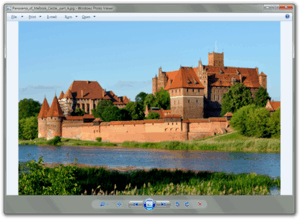Windows Photo Viewer
| A component of Microsoft Windows | |
|---|---|
|
| |
|
Windows Photo Viewer in Windows 7 | |
| Details | |
| Included with |
Windows XP, Windows 7 and later Windows Server 2003 and later |
| Replaces | Imaging for Windows, Windows Photo Gallery |
| Related components | |
|
Windows Live Photo Gallery Windows Imaging Component | |
Windows Photo Viewer (formerly Windows Picture and Fax Viewer)[1] is an image viewer included with Windows NT family of operating system. It was first included with Windows XP and Windows Server 2003 under its former name. It was temporarily replaced with Windows Photo Gallery in Windows Vista,[2] but has been reinstated in Windows 7.[3] This program succeeds Imaging for Windows. In Windows 10, it is deprecated in favor of a Windows Store app called Photos, although it can be brought back with a registry tweak.[4]
Windows Photo Viewer can show individual pictures, display all pictures in a folder as a slide show, reorient them in 90° increments, print them either directly or via an online print service, send them in e-mail or burn them to a disc.[3][5][6] Windows Photo Viewer supports images in BMP, JPEG, JPEG XR (formerly HD Photo), PNG, ICO, GIF and TIFF file formats.[7]
Evolution
Compared to Windows Picture and Fax Viewer, changes have been made to the graphical user interface in Windows Photo Viewer.
Whereas Windows Picture and Fax Viewer uses GDI+, Windows Photo Viewer uses Windows Imaging Component (WIC)[8] and takes advantage of Windows Display Driver Model.[9]
Although GIF files are supported in Windows Photo Viewer, whereas Windows Picture and Fax Viewer displays animated GIFs, Windows Photo Viewer only displays the first frame.[10] Windows Picture and Fax Viewer was also capable of viewing multi-page TIFF files, (except those that employ JPEG compression)[11] as well as annotating the TIFF files.[12][13] Windows Photo Viewer, on the other hand, has added support for JPEG XR file format[7] and ICC profiles.[14][15]
See also
References
- ↑ "Windows Picture and Fax Viewer overview". Windows XP Professional Product Documentation. Microsoft Corporation. Retrieved 23 November 2010.
- ↑ "What happened to the Windows Picture and Fax Viewer?". Windows Vista Help & How-to. Microsoft Corporation. Retrieved 22 November 2010.
- 1 2 "View and use your pictures in Windows Photo Viewer". Windows 7 Help & How-to. Microsoft Corporation. Retrieved 23 November 2010.
- ↑ "How get Windows Photo Viewer working in Windows 10 RTM". winaero.com.
- ↑ "Windows Photo Viewer slideshow turns secondary monitor black". Microsoft TechNet Forums. Microsoft Corporation. 5 February 2010. Retrieved 29 January 2011.
- ↑ "How to Run the Windows Photo Viewer Slide Show on a Secondary Monitor". WindowsSevenForums Tutorials. Designer Media Ltd. 2 October 2010. Retrieved 29 January 2011.
- 1 2 Understanding Picture File Types
- ↑ "Introduction (How to Write a WIC-Enabled Codec) (Windows)". Microsoft Developer Network. Microsoft Corporation. 22 November 2010. Retrieved 29 January 2011.
- ↑ "Windows Vista Display Driver Model". Microsoft Developer Network. Microsoft Corporation. July 2006. Retrieved 29 January 2011.
- ↑ Zhu, Sean (1 June 2010). "Why does Windows Picture Viewer does not show animated GIFs?". TechNet forum. Microsoft Corporation. Retrieved 24 November 2010.
Q: I have noticed that in Windows 7, the Windows Picture viewer only displays the first frame of an animated GIF. Why is this? [~snip~] A: Hi, this is by design.
- ↑ You Cannot View TIFF Images Using Windows Picture and Fax Viewer
- ↑ "Windows Picture and Fax Viewer Annotation overview". Windows XP Professional Product Documentation. Microsoft Corporation. Retrieved 23 November 2010.
- ↑ "Annotation toolbar overview". Windows XP Professional Product Documentation. Microsoft Corporation. Retrieved 23 November 2010.
- ↑ "Delete Calibrated Display Profile to Increase Speed of Windows 7 Photo Viewer". My Digital Life. 24 January 2010. Retrieved 29 January 2011.
- ↑ "Windows Vista Photo Gallery Yellow Tint Background Problem". My Digital Life. 11 July 2007. Retrieved 29 January 2011.
External links
- Official website
- Windows Picture and Fax Viewer overview
- Windows Picture and Fax Viewer Overview at the Wayback Machine (archived 5 January 2008)
